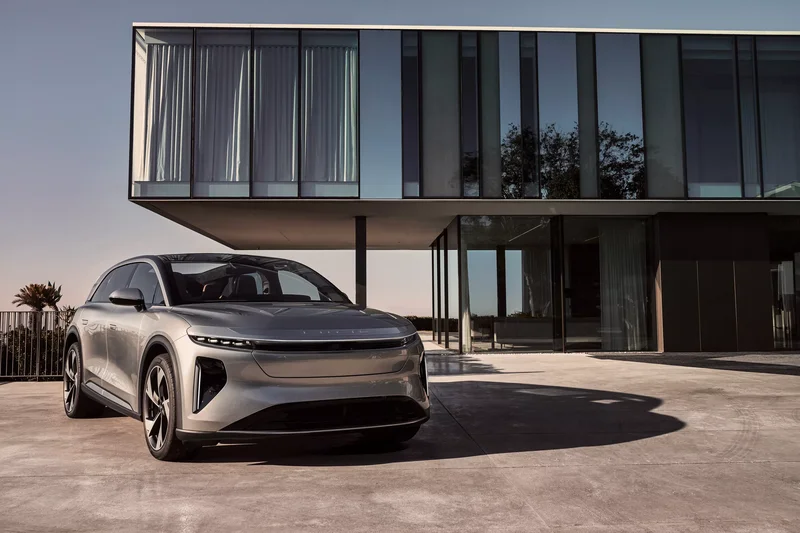Generated Title: Lucid Gravity's "Best Luxury Vehicle" Award: A Data Analyst's Reality Check
Okay, so the Lucid Gravity won some "Best Luxury Vehicle" award for 2026. Big deal. Awards are marketing, and marketing is… well, let's just say it rarely aligns perfectly with reality. As always, we need to look under the hood, past the press releases, and into the actual data.
Range Anxiety: Addressed, But At What Cost?
The core selling point seems to be the range: a claimed 450 miles. That's significant, no doubt. It puts the Gravity in the same ballpark as Tesla's Model X, and frankly, blows away a lot of the competition. But let's be real: range is a function of battery size, and battery size is a function of weight (and cost). The Gravity packs a 123-kilowatt-hour battery. That's massive. It’s like strapping a small power plant to your SUV.
And that's where the questions start. All that juice comes at a price, both literally (we're talking about a $120,000 vehicle here) and figuratively. How much of that "luxury" experience is simply a consequence of throwing massive amounts of battery at the problem? Is it really innovative engineering, or just brute-force economics?
The reviews talk about a "glassy-smooth ride" and "adroit, lively handling." But how much of that is the air suspension, and how much is simply the stabilizing effect of a multi-ton battery pack slung low in the chassis? It's easy to make something feel planted when it weighs as much as a small apartment building. The claim is that the adaptive dampers still provide a smooth ride even in their firmest ‘Sprint’ setting, but I wonder if that's just marketing fluff.
The 0-60 mph time is quoted at 3.3 seconds, which is frankly absurd for an SUV. But again, that's just raw horsepower (828 HP, to be exact) overwhelming everything else. It’s a fun party trick, but does it actually contribute to a luxury experience, or just a really fast one? And how sustainable is that kind of performance in the real world? I suspect that number is achieved under absolutely ideal conditions (temperature, tire pressure, battery charge level, etc.).
The "Luxury" Interior: Substance or Just Style?
Then there's the interior. "Sustainable open-pore walnut inlays" and "PurLuxe faux leather." It all sounds very nice, very eco-conscious. But what's the actual cost and environmental impact of producing these materials? "Sustainably sourced" can mean a lot of things, and often hides a more complex reality. (A parenthetical clarification: I'm not saying it's not sustainable, just that the marketing glosses over the details.)

The 34-inch instrument cluster display and 12.6-inch center touchscreen are impressive, sure. But let's be honest, screen real estate isn't exactly a scarce commodity in modern cars. Every manufacturer is throwing screens at the dashboard, hoping something sticks. The real question is how intuitive and useful the software is. The reviews praise Lucid’s software and UI design, calling it iPad-like in smoothness. But software is a moving target. What's smooth and intuitive today can be clunky and outdated tomorrow.
And this is the part of the report that I find genuinely puzzling. The podcast "Talking Cars" noted significant software glitches and build-quality issues. Which is it? Is the Gravity a meticulously crafted luxury vehicle, or a glitchy, unfinished product? The discrepancy between the marketing and the anecdotal evidence from actual drivers is… troubling.
The reviews also mention the spaciousness of the interior, particularly the third-row seat. But again, this is a function of size. The Gravity is a full-size SUV. It should be spacious. The more relevant question is how efficiently that space is used, and whether the design compromises other aspects of the vehicle (like aerodynamics or handling).
The claim is that it beats out much larger vehicles for passenger comfort and cargo-carrying ability. But I haven't seen any hard data comparing the Gravity’s interior dimensions to its competitors. The towing capacity is quoted at 6000 pounds, which is decent for an EV SUV. But again, towing significantly reduces range, negating one of the Gravity's primary selling points. It's a classic case of having your cake and eating it too—or at least, claiming to.
Smoke and Mirrors?
Look, I'm not saying the Lucid Gravity is a bad vehicle. It's clearly a well-engineered, high-performance SUV with a lot to offer. But the "Best Luxury Vehicle" award seems a bit premature. It feels like the hype is outpacing the reality. Luxury is about more than just range, horsepower, and screen size. It's about attention to detail, build quality, and a consistent, refined experience. And based on the available data (and the anecdotal reports of software glitches), the Gravity still has some way to go.
